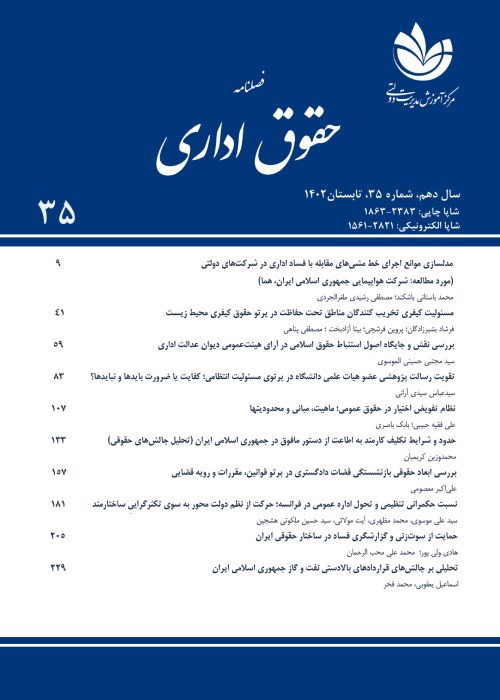Contemplation on the Changes in Appeal in Administrative Justice Court
Author(s):
Abstract:
Man is naturally potential to make mistakes. For the purpose of correcting mistakes or error of the judge in the proceeding and to observe a justified prosecution and to observe fair trials as one of the rights and defense tools of the parties to the litigation (namely the losing party in the base), the legislator has predicted the possibility of renewing proceeding by aiming at minimizing the errors and factors in breach occurrence. In all judiciary systems, the requirements related in observing the accessibility to court have been recognized in the appeal stage as well. Given the different approaches regarding seeking to appeal, almost all the countries accepted unanimously. The administrative proceeding in Iran has been facing lots of ups and downs since the establishment of administrative justice court through the present time. In 1981, the verdicts could be objected only if they were against the administrative unit. Subsequently in 1999 and by amending the law, almost all verdicts could be objected by any party; however, the interesting point was that in 2006, the legislator had a completely different view from its former position and accepted the principle of certainty of the vote and recognized final verdicts liable to seek appeal in exceptionalcases. The legislator once again revived appeal in the court in absolute form. In sum, it seems that the legislator has shown excess and defect in handling appeal cases; the appeal chambers are either eliminated completely and the verdicts of chambers of the court are recognized as final; or all the verdicts of the initial chambers are recognized to be liable in seeking appeal. It seems a suitable approach in this case is making a severance in quality and nature (separating administrative decisions from semi-judiciary decisions) and quantitative (separating important and less important decisions) and the possibility of recognizing or rejecting appeal (predicting appeal for important administrative decisions and eliminating appeal for less important cases and objection to semi-judiciary decisions), while establishing initial and appeal administrative courts under the category of administrative justice court (as the higher appeal source) as wellas dividing the claims into three levels based on the case type and their importance.
Keywords:
Language:
Persian
Published:
Administrative Law, Volume:2 Issue: 5, 2014
Page:
9
magiran.com/p1616910
دانلود و مطالعه متن این مقاله با یکی از روشهای زیر امکان پذیر است:
اشتراک شخصی
با عضویت و پرداخت آنلاین حق اشتراک یکساله به مبلغ 1,390,000ريال میتوانید 70 عنوان مطلب دانلود کنید!
اشتراک سازمانی
به کتابخانه دانشگاه یا محل کار خود پیشنهاد کنید تا اشتراک سازمانی این پایگاه را برای دسترسی نامحدود همه کاربران به متن مطالب تهیه نمایند!
توجه!
- حق عضویت دریافتی صرف حمایت از نشریات عضو و نگهداری، تکمیل و توسعه مگیران میشود.
- پرداخت حق اشتراک و دانلود مقالات اجازه بازنشر آن در سایر رسانههای چاپی و دیجیتال را به کاربر نمیدهد.
دسترسی سراسری کاربران دانشگاه پیام نور!
اعضای هیئت علمی و دانشجویان دانشگاه پیام نور در سراسر کشور، در صورت ثبت نام با ایمیل دانشگاهی، تا پایان فروردین ماه 1403 به مقالات سایت دسترسی خواهند داشت!
In order to view content subscription is required
Personal subscription
Subscribe magiran.com for 70 € euros via PayPal and download 70 articles during a year.
Organization subscription
Please contact us to subscribe your university or library for unlimited access!


